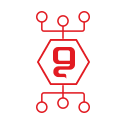denial of service (DDoS) attack
A denial of service (DDoS) attack is a malicious attempt to disrupt the normal traffic of a server, service, or network by flooding the target or the surrounding infrastructure with Internet traffic.
DDoS attacks gain effectiveness by using multiple compromised computer systems as sources of attack traffic. Exploited machines can include computers and other networked resources such as IoT devices. A DDoS attack is like a sudden traffic jam that blocks the highway, preventing normal traffic from reaching its destination.
On October 7, 2023, at the same time as the missile attack, Hamas launched a significant cyber attack against Israeli websites, newspaper and media websites were the main target of DDoS attacks, they constitute 56% of all attacks against Israeli websites since the attack on October 7.
Hamas is not the only group responsible for the attacks. Various pro-Palestinian activist groups targeted a number of Israeli websites and mobile applications. For example, the AnonGhost attack group exploited a vulnerability in the "Red Alert" application. The exploit allowed them to intercept requests, expose servers and APIs, and send fake notifications to some of the app's users.
Since October 7, DDoS attacks on Israeli websites have increased almost 10 times the average.
Who is it suitable for?!
DDoS attacks can be devastating to businesses, especially those that rely on their online presence. If a business has a website or any other online service that is critical to their operations, it is recommended to invest in DDoS protection.
It is especially important if the business is in the financial, healthcare or government sectors, as these industries are often targeted by cybercriminals.
How do you protect the organization from DDoS attacks?!
DDoS defenses work by detecting and blocking malicious traffic before it reaches the target server or network. This is done by analyzing traffic patterns and filtering traffic that is considered suspicious or malicious.
DDoS protection services can also use rate limiting to slow down traffic and prevent it from overwhelming a target.
Leading companies that offer protection tools against these attacks:
Imperva:
Offers a comprehensive DDoS protection service that secures all edge assets without interruption.
The system provides immediate high-capacity DDoS mitigation with guaranteed uptime and no impact on performance. The system handles all incoming DNS requests, using a combination of reputation and heuristics.
Radware:
provides a comprehensive DDoS protection service called DefensePro, which can be tailored to your specific needs. It protects against IoT, Burst, DNS and TLS/SSL based attacks to secure organizations against multi-vector attacks on the network.
Cloudflare:
Offers three DDoS protection solutions for internet, application and network threats: Website, Spectrum and Magic Transit
Website DDoS Protection – Web Services (L7)
Application DDoS Protection – Spectrum (L4)
Network DDoS Protection – Magic Transit (L3
The author: Zabri Idan, VP of expert services and information security at Genie
You may be interested in:

אירוע משפחות סוף קיץ 2025


פישינג בעסקים: איך לזהות, למנוע ולהגיב נכון


החשיבות של סריקות פגיעויות באבטחת סייבר






